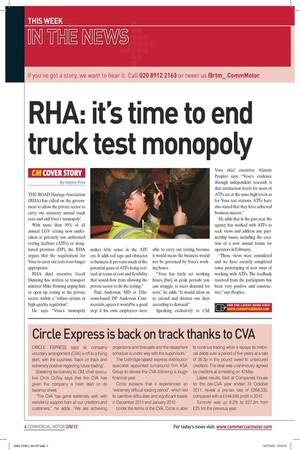RHA: it’s time to end truck test monopoly
Page 4

If you've noticed an error in this article please click here to report it so we can fix it.
By Hayley Pink THE ROAD Haulage Association (RHA) has called on the government to allow the private sector to carry out statutory annual truck tests and end Vosa’s ‘monopoly’ .
With more than 50% of all annual LGV testing now undertaken at privately run authorised testing facilities (ATFs) or designated premises (DP), the RHA argues that the requirement for Vosa to carry out tests is no longer appropriate.
RHA chief executive Geoff Dunning has written to transport minister Mike Penning urging him to open up testing to the private sector, within a “robust system of high-quality regulation” .
He says: “Vosa’s monopoly makes little sense in the ATF era. It adds red tape and obstacles to business. It prevents much of the potential gains of ATFs being realised, in terms of cost and lexibility that would low from allowing the private sector to do the testing.” Paul Anderson, MD at Ellistown-based DP Anderson Commercials, agrees it would be a good step if his own employees were able to carry out testing, because it would mean the business would not be governed by Vosa’s working hours.
“Vosa has fairly set working hours, [but] in peak periods you can struggle to meet demand for tests,” he adds. “It would allow us to extend and shorten our days according to demand.” Speaking exclusively to CM, Vosa chief executive Alastair Peoples says: “Vosa’s evidence through independent research is that satisfaction levels for users of ATFs are at the same high levels as for Vosa test stations. ATFs have also stated that they have achieved business success.” He adds that in the past year the agency has worked with ATFs to seek views and address any partnership issues, including the creation of a new annual forum for operators in February.
“Those views were considered and we have recently completed some prototyping of new ways of working with ATFs. The feedback received from the participants has been very positive and constructive,” says Peoples.








































